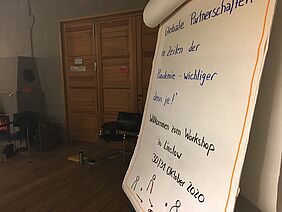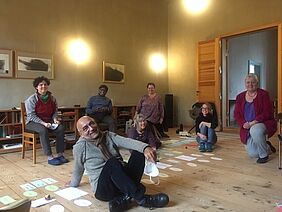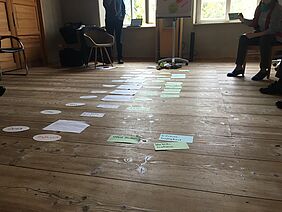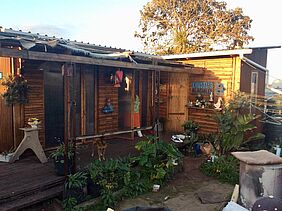The sky is grey when I leave the manor house. But at least it is slowly becoming brighter. I start running. The road is wet, the fallen leaves are slippery. It is unusually warm and a slight drizzle muffles every sound. No people, no human-made disturbance. Time to think, time to reflect.
It is the beginning of the second workshop day in Linstow, Mecklenburg Vorpommern. Initiated by the provincial network of One World the workshop takes place in a manor house in Linstow, a small village surrounded by woods and lakes. We are lucky to participate in person. The new Covid19-lockdown is going to start two days later. Masks and distance and hand sanitizer are our best friends during the whole time.
The first day was under the banner of getting to know each other. Five people, including me, from different associations in Mecklenburg Vorpommern and three coordinators respectively lecturers followed the invitation. Most of them have project partners in Afrika, one is working in an association to support refugees. Some people invited did not come because of Covid19. Some were not allowed to come because of Covid19.
The virus defined most of the conversations and it defined the topic of the workshop:Global partnerships in times of pandemic. After a brief introduction of everyone, we talked about, what we expect from the two days. What do we want to achieve? Which topics are preying on our minds? How did everyone deal with the pandemic so far?
While I am running through the woods of Linstow my head is still full of thoughts. The leaves under my feet rustle. I left the tar road a few minutes ago. The path is partly muddy and I have to take care to avoid puddles. Most of the others seemed to have dealt quite well with the situation. The projects continued, the support was high, the communication kept going. But still: Everyone had worries about the future. With Corona at the doorstep, public relations activities are difficult and travel almost impossible (and in most cases irresponsible anyway). We could not find any solution, but the exchange of ideas, thoughts, experiences, and concerns was of the same value.
The conversation continued well after dinner. With the official part being over the topics shifted to us as persons and our individual experiences. So instead of talking about our actual Joint Action Project and everything project-related (in my case), it was more about our daily life. Township-party instead of architectural plannings, if you like. But not just South Africa was a topic. With the others coming from Ethiopia or having lived in Tanzania or been to Gambia, we had a lot of experiences and thoughts to share.
I almost stepped into a puddle with muddy water when the impressions from the evening before cross my mind. It was not just the conversation about our life in Port Elizabeth, that brought back so many memories, we also watched a movie that left all of us thinking. The documentary depicted the lives of Black people in the GDR as well as in the FRG. And it showed, that not much has changed since then, being it exclusion, rejection, or pure racism.
I turn into the street leading towards the manor house. The old brick building appears between the autumn trees. A few roses are still flowering in the circular flowerbed in front of the entrance. It is quiet, the whole house seems to be still asleep. At least from the outside. Inside it is buzzing with preparations for breakfast and people stopping for a short chat in the hallways.
After breakfast, the second part of the workshop begins with a few interactive exercises outside. The clouds from the early morning have moved and the sun shines.
One exercise, in particular, is still on my mind: Our lecturer made statements which we should agree, partly agree, or disagree with. The statements ranged from „I never go grocery shopping without a shopping list.“ to „When I want to rent a new flat, I do not have to think about my skin colour/name.“
Nothing reveals the subtle racism that is still so deeply anchored in the mindset of Western countries than answering to those statements and see how other people answer.
Back in the seminar room, the mood is still low. Everyone is lost in their own thoughts. Hearing about the establishment of racism, colonialism, control, and power is not really cheering anyone up. But the theoretical exploration of the roots of (institutional) racism creates a base of knowledge from where we move on. The next part of the workshop includes quotes. We work together in pairs. The quotes have no date, no name on them. That is our task to find out.
Once finished, we create a timeline. Only then our lecturer resolves who said what and when. Being shocked would be an understatement. Until well in the 1960s, dictionaries displayed through and through racist entries and descriptions. And even in the late 2000s, development researchers assume that the „developed“ countries of the Northern hemisphere are the only ones who can help the „under-developed“ countries to reach a defined level of „development“.
But what can we do against that? Are not we the ones who display exactly that attitude with our projects and associations? We analyse, discuss, develop, and share ideas. And we realise: The key is participation, an open mind, open communication, and the willingness to accept different perspectives and opinions. It does not help anyone if we project our own needs (or the needs we think other people have) onto other people’s life. By the way, that counts for every part of life, not just non-profit-work.
These thoughts are still in my head as I drive home. The highway is empty. I can let my mind wander. The dusk arrives. The light beams of the headlights are soon the only hint of other cars.
With the words from the previous paragraph in mind, I think I can say with a good conscience: We did a lot of things right in South Africa. Not everything was perfect. There is always room for improvement. But all in all, we followed the right ideas, the right approaches. For a project that is making a real difference. And for a better world. Let us hope that we can continue next year.




